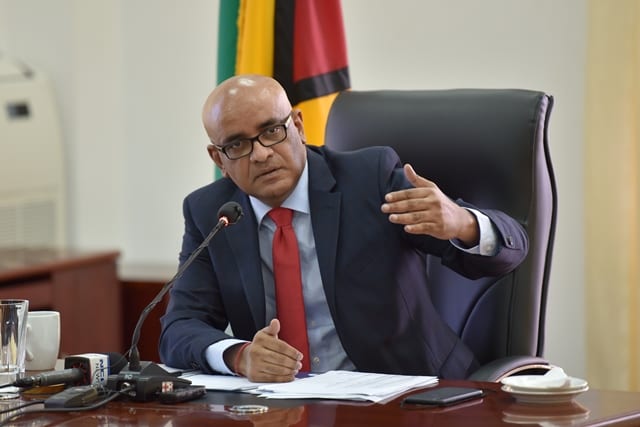Even as the government in Guyana continues its efforts to have a robust Natural Resource Fund (NRF) legislation in place that insulates the oil revenues from political abuse, the administration is also working on having a simplified formula for spending and savings. This much was said by Vice President, Dr. Bharrat Jagdeo during his most recent press conference.
The former Guyanese Head of State said, “We already have someone working on the Natural Resources Fund legislation, as well as a simple formula that Guyanese can understand how much comes to the budget and how much is saved. We want laymen to understand how much money you collect so that they can go to the Official Gazette once a year, the ministry’s website or Parliament’s website and know how much money there is and then how much comes to the budget.”
He added, “Through the budgetary process, the Minister of Finance must go to the parliament and say ‘this is how we are utilizing the money’ so you can have a debate in parliament. So, we want a simple, transparent, understandable process. When you try to utilize complex formulas, like the fiscally sustainable amount and all of that nonsense…then you end up in trouble because it leaves room for manipulation.”
Hopefully, before the end of the year, that draft legislation will be tabled too, said the Vice President.
Wealth fund legislation for Guyana’s Parliament before year end – Ali
The NRF Act was passed in December 2019 by the previous government without the support of the then political opposition party which now forms the current administration.
Prior to its passage, the legislation was criticized for having a fiscal rule that is complex and hard to understand, particularly by the public, and oversight bodies. As a result, the International Monetary Fund and the Natural Resource Governance Institute both urged Guyana to simplify its fiscal rule governing withdrawals and savings.
According to the current legislation: The amount that the [finance] minister shall request the National Assembly to approve as the withdrawal from the Fund for the next ensuing fiscal year shall be included in the annual budget proposal and shall not exceed, for that year, the economically and fiscally sustainable amount plus any amount required for emergency financing.
The Act states that the economically and fiscally sustainable amount for a fiscal year shall be the lesser of the following amounts – (a) the economically sustainable amount for that fiscal year; and (b) the fiscally sustainable amount for that fiscal year.
The economically sustainable amount is the maximum amount that can, in the opinion of the minister after taking into account the recommendations of the Macroeconomic Committee established under section 20, be withdrawn from the Fund for the next ensuing fiscal year without diminishing the competitiveness of Guyana’s economy.
The fiscally sustainable amount is the maximum amount that can be withdrawn from the Fund in a fiscal year while ensuring the long-term financial sustainability of the Fund, a fair inter-generational distribution of natural resource wealth and maintaining stability in the annual withdrawals from the Fund.
The law states that the minister is responsible for calculating the fiscally sustainable amount.
As of October 31, 2021, revenues in the NRF amounted to US$534 million. The government has been keen not to include any of the oil funds in its budgetary configurations since it believes that the laws governing the NRF are not robust enough to protect it from mismanagement and political interference.



